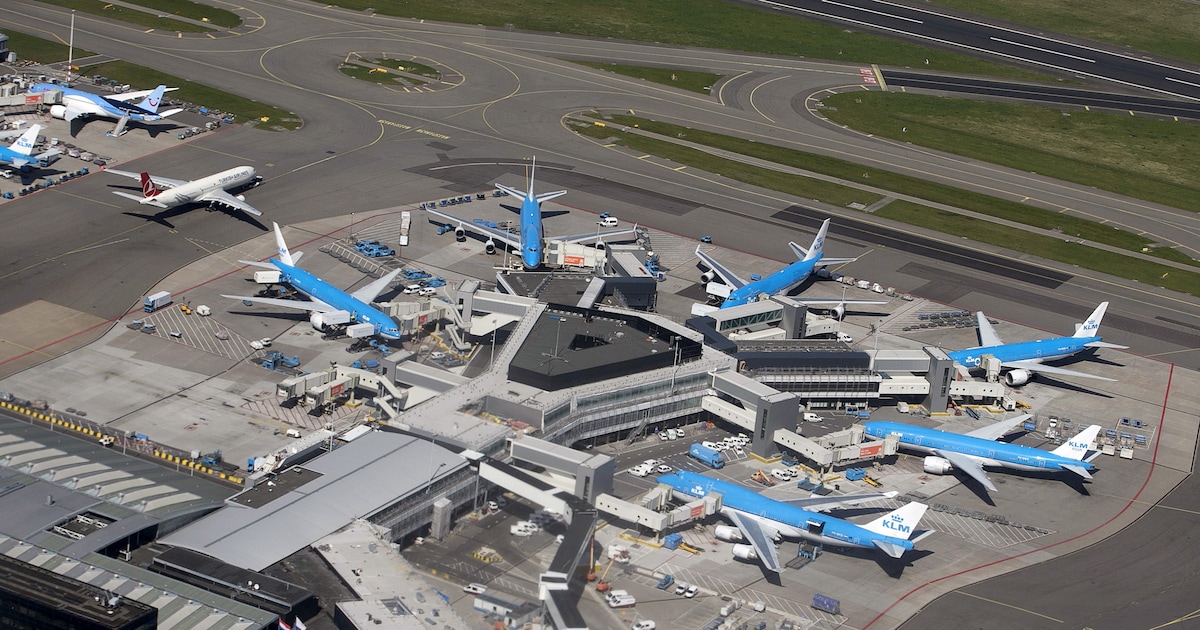
Because so many passengers use KLM planes to travel to places around the world, the Netherlands’ largest airline emits much more CO₂ than KLM had promised. This follows from research carried out by the Breda University of Applied Sciences (BUas) on behalf of Milieudefensie.
“Partly due to KLM’s focus on these ‘diversions’, the airline will emit up to 6 percent more CO₂ in 2030, instead of 48 percent less, as prescribed in the Paris climate agreement,” Milieudefensie said. Therefore, the action group will travel to Charles de Gaulle airport in Paris with more than a hundred shareholder activists to ask questions at the Air France-KLM shareholder meeting.
’60 percent detour via Schiphol’
“Instead of reducing emissions, KLM is consciously increasing its emissions and even wants to fly more. This is absurd and that is why we are in Paris,” says Winnie Oussoren of Milieudefensie. Researchers analyzed data from KLM flights and found that an average diversion is responsible for twice as much CO₂ emissions compared to someone flying to or from the Netherlands.
Paul Peeters, professor of transport and sustainable tourism at BUas: “60 percent of KLM passengers divert via Schiphol and this group is responsible for 78 percent of all the airline’s emissions.” According to Peeters, KLM can reduce CO₂ emissions by reducing the number of connections, which are mainly used for diversions. “This will not substantially damage the direct connection network, which is important for the Netherlands,” analyzes Peeters.
It is not the first time that an investigation questions the transfer function of Schiphol. At the beginning of April, aviation experts Eric Pels of VU Amsterdam and Paul Peeters himself also published a study on Schiphol as a transfer center. Income and social costs were “honestly balanced against each other”, with the conclusion that an airport reduction can even lead to economic growth. The study was carried out on behalf of Natuur & Milieu.
‘KLM believes in castles in the air’
KLM sees this very differently. “If that hub function disappeared, we would still have six direct destinations instead of the current 170,” said KLM boss Marjan Rintel in an interview with this newspaper. In the event of a reduction, transit passengers will travel through another airport and moving is not the same as making it more sustainable, says KLM. KLM prefers to outline a future with cleaner, quieter planes that fly on sustainable fuel.
KLM’s response to the study commissioned by Milieudefensie remains the same: “We share Milieudefensie’s concern about climate change and therefore take responsibility for reducing our CO₂ emissions. We achieve this, for example, by investing billions in a cleaner and quieter fleet, alternative fuels and electrification of raw materials.” Milieudefensie responds: “KLM believes in pie in the sky.”
Activists and big companies have been operating in the same circle for years. This is the case of KLM and Schiphol, but also of Shell, Tata Steel, Unilever and the Zuidas banks. The repetitive pattern? Green and environmental associations say, whether at shareholder meetings or not, that the company is doing too little to protect the planet, the companies respond that they are already doing a lot, and so the ritual dance continues tirelessly.
Less polluting in the future
Shell CEO Frans Everts recently called on activists and other critics in this newspaper to work together: “Now stand with us.” He did so after fulfilling his ritual: That Shell had made investment decisions worth 6.5 billion in the Netherlands, making it “by far the largest private investor in the energy transition.”
Does Milieudefensie see anything in the idea of not being in front of KLM, but next to it? Spokesperson Winnie Oussoren does not think twice: “Environmental Defense calls on KLM to be on the side of society by adhering to the international Paris climate agreement. As long as KLM continues to divert in ways that are dangerous to the climate, it will not achieve its climate goals. In this way, KLM places itself outside society.”
KLM advocates “not unilaterally addressing the impact of aviation”: “Aviation contributes positively in the form of connections, which are important for the prosperity of the Netherlands as a trading country and for employment. Together we must find a new balance in this. “KLM’s job is to make flights less polluting in the future.”
Also read:
Shell boss Frans Everts is hopeful about the climate, but his daughter criticizes him.
Frans Everts, CEO of Shell Netherlands, calls on action groups and other critics: “Now stand with us.”
Marjan Rintel, head of KLM: “If flights increase, let’s talk about how we solve the problems”
KLM wants to reduce short flights with a renovated train ticket sales point at the Brussels South station, its director Marjan Rintel explains in a conversation between railway workers. “But we can not do it alone”.